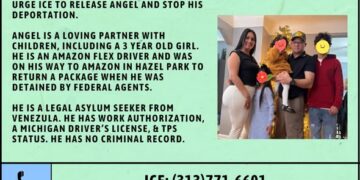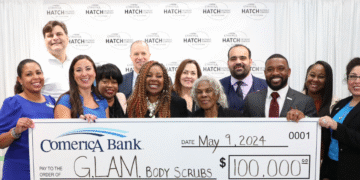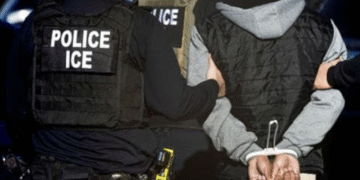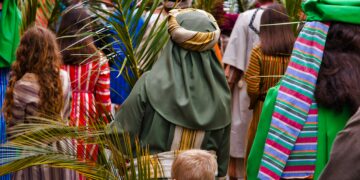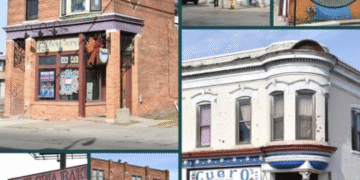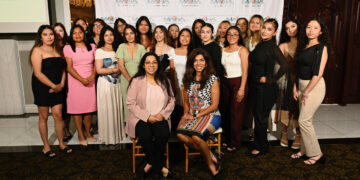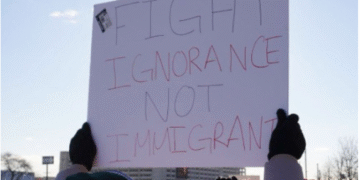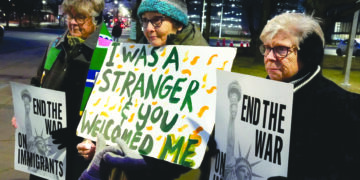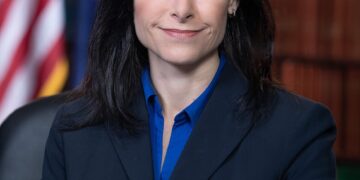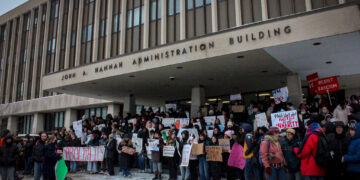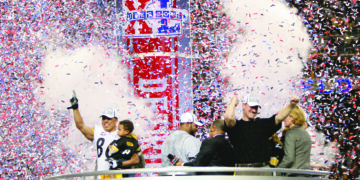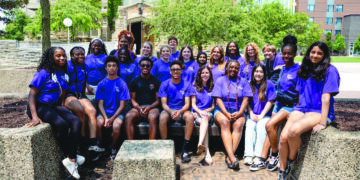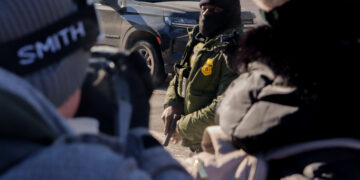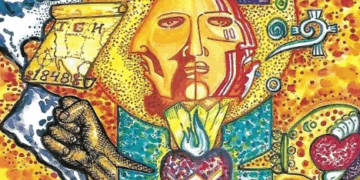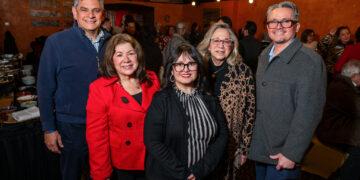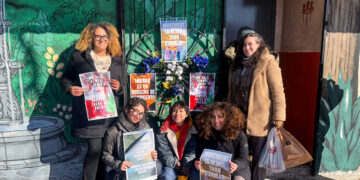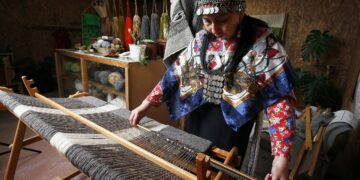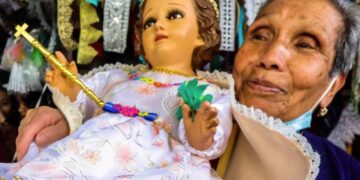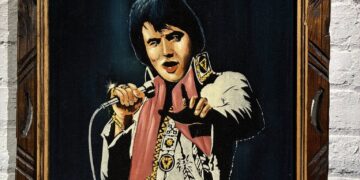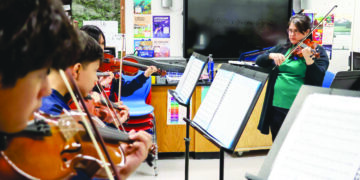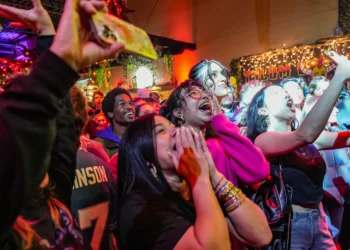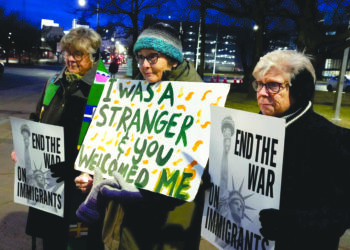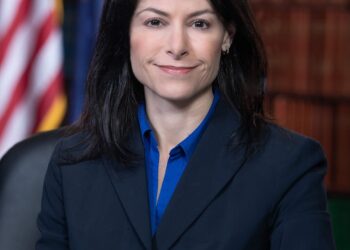Most Catholics will be well aware of where they were when it was announced that Pope Leo XIV was the first American pope.
Detroit Archbishop Edward J. Weisenburger will remember that he was flying Delta. Coach, to be more precise.
“We were taxiing, and I was in coach and squeezed in next to someone next to me, and just as soon as I turned off the airplane setting, my phone began to go, ‘Beep, beep, beep,’ and I went straight to a live feed and I heard the actual words, ‘Habemus papam,’” Archbishop Weisenburger said during a press conference last Thursday afternoon at the Cathedral of the Most Blessed Sacrament following the news of the election of Chicago-born Cardinal Robert F. Prevost as the 267th pope.
Archbishop Weisenburger, who was returning from Omaha and the installation of Archbishop Michael G. McGovern, confessed it was just his seatbelt that prevented him from standing up and dancing, right there on the plane.
Pope Leo XIV, born Robert Prevost of Chicago, was elected as the 266th successor to St. Peter, the first pope in history to come from the United States.
“I never in my lifetime though there would be an American pope,” Archbishop Weisenburger said. “For a long time, the concern was geopolitics, of course, and that certain countries, nations would fear the United States had sort of taken over the papacy of the Catholic Church.”
Archbishop Weisenburger said Pope Leo XIV, an Augustinian bishop who served most of his priesthood in Peru, including as the first bishop of Chiclayo, Peru, would bring his international experience to the papacy and said there should be little concern about his American background.
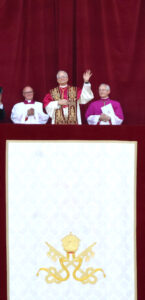
In 2023, Pope Francis called him to serve as prefect for the Vatican’s Dicastery for Bishops, and he was created a cardinal the same year.
“You get the very clear impression that this is a man of incredible talents and a variety of gifts and blessings,” Archbishop Weisenburger said. “Among those are the importance of a social justice message of universal brotherhood. I think he is a man who will continue the wonderful legacy we’ve had with recent popes of standing always with the poor, always with those who are downcast, always with those who are suffering, and reminding us that we have a universal brotherhood and sisterhood.”
Before the recently elected pontiff was ordained a bishop, he was prior general of the Augustinians and had relationships with the bishops where priests of the order were assigned, including in the Diocese of Tucson, Archbishop Weisenburger’s prior episcopal assignment.
“I had (an Augustinian priest) there and my predecessor, Bishop (Gerald F.) Kicanas, who’s temporarily running my former diocese in Tucson, met with (the future Pope Leo XIV) a number of times,” Archbishop Weisenburger said.
Pope Leo XIV’s time as an Augustinian missionary in Peru, including serving at a seminary in Peru and later returning as the first bishop of Chiclayo, gives the new pontiff a rich perspective on what it means to lead a Church on mission.
Archbishop Weisenburger described Pope Leo XIV as a “theological moderate,” who will build on the work of his immediate predecessors.
“I think what we’re going to find with Pope Leo is he’s very much going to be in the image of Christ,” Archbishop Weisenburger said. “Theologically, he seems to be a moderate, and I must admit I love moderates. I find working out of the heart of the Church and avoiding these two extremes that sometimes suck all the air out of the room — moderates, deeply dug into the Church theologically — I like that. I find they are sensible, they are thoughtful, they stand in the footsteps of tradition.”
Archbishop Weisenburger also noted that when the new pope spoke from the loggia above St. Peter’s Square, “he talked about the poor, the suffering, standing with those in need, immigrants, migrants, all of that.”
“I think socially you’re going to find he’s a man who, again, reminds us we are not simply members of a nation or a state or a region; ours is a universal brotherhood where there is no one who can be excluded.”
As the world gets to know more about Pope Leo XIV, including his Michigan connection — he studied at the now-closed St. Augustine Seminary High School in Holland — Archbishop Weisenburger pointed out there is much to glean from his selection of Leo as his papal name, drawing back to Pope Leo XIII, who reigned as pontiff from 1878 to 1903 and is known as the “Social Pope” and the “Pope of the Workers.”
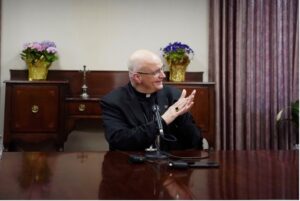
“If you go back to the most immediate Leo, Leo XIII, his famous theological work, ‘Rerum novarum,’ was all about social justice. It was about brotherhood and unity, and it was about the rights of workers and their dignity,” Archbishop Weisenburger said. “He was also a man who released profound teachings on the rosary. He released two new Marian scapulars for the faithful during his lifetime. So this man, Leo XIII, really encapsulated the Church’s understanding of what we would call social justice — not just charity, which is the rich giving to the poor, of those who have giving to those who have not — but helping people to understand they have rights. They have rights as humans. They have an essential dignity that cannot be compromised, and I think all of that rich understanding is behind our new Pope Leo taking that name.”
The timing of the death of Pope Francis and the election of Pope Leo XIV means that Archbishop Weisenburger will receive his pallium — a white fabric woven from lamb’s wool that signifies his rank as a metropolitan archbishop — from the new pontiff, rather than from the pope who appointed him archbishop of Detroit.
Archbishop Weisenburger said he looks forward to that occasion, which traditionally takes place on June 29, the Solemnity of SS. Peter and Paul, in Rome.
“There was a jealous part of me that was a little disappointed at the death of Pope Francis, even though I rejoiced for the glory that I believe is his, the eternal life, but nevertheless, I’d been hoping to receive (the pallium) from his hands,” Archbishop Weisenburger said. “Yet, I realize there are blessings with every twist and turn of life, and it will be a great blessing to have been sent here by Francis and to have the pallium given to me by Leo.”
After finding out the news of Pope Leo’s election on a Delta flight, Archbishop Weisenburger said passersby at Detroit Metropolitan Wayne County Airport stopped to congratulate him and to ask him what the new pontiff’s election means for the local Church. The archbishop admitted he hadn’t had too much time to reflect on what it will mean to have an American pope — and one from the Midwest, at that.
“There’s a certain amount of pride we Americans can take in this,” Archbishop Weisenburger said at the end of the press conference. “I believe he went to high school seminary here in Michigan, in Holland, that’s not there anymore. So we can claim him,” the archbishop joked.
“I’m happy for the world, and I’m happy for the people of the Archdiocese of Detroit,” Archbishop Weisenburger added.
Archbishop Weisenburger celebrated a Mass of Thanksgiving at the Cathedral of the Most Blessed Sacrament on Saturday, May 10.
El Papa León XIV es “un hombre con muchos dones” que guiará a la Iglesia con sabiduría, afirma el arzobispo
La mayoría de los católicos recordará perfectamente dónde estaba cuando se anunció que el Papa León XIV se había convertido en el primer pontífice estadounidense.
El Arzobispo de Detroit, Edward J. Weisenburger, recordará que iba volando por Delta. En clase turista, para ser exactos.
“Estábamos rodando por la pista, yo iba en clase turista, apretado junto a otra persona, y apenas apagué el modo avión, mi celular empezó a sonar: ‘bip, bip, bip’. Me conecté enseguida a una transmisión en vivo y escuché las palabras: ‘Habemus papam’”, contó el Arzobispo Weisenburger durante una conferencia de prensa el jueves por la tarde en la Cathedral of the Most Blessed Sacrament, poco después de que se conociera la elección del cardenal Robert F. Prevost, oriundo de Chicago, como el Papa número 267.
El Arzobispo Weisenburger, que regresaba de Omaha tras la instalación del Arzobispo Michael G. McGovern, confesó que no pudo levantarse y ponerse a bailar ahí mismo en el avión porque llevaba puesto el cinturón de seguridad.
El Papa León XIV, nacido Robert Prevost en Chicago, fue elegido como el 266º sucesor de San Pedro, convirtiéndose en el primer Papa estadounidense en la historia.
“Nunca imaginé en mi vida que tendríamos un papa estadounidense”, comentó el Arzobispo Weisenburger. “Durante mucho tiempo, la preocupación era la geopolítica, y que algunos países temieran que Estados Unidos hubiera tomado el control del papado de la Iglesia Católica.”
El Arzobispo Weisenburger destacó que el Papa León XIV, un obispo agustiniano que pasó la mayor parte de su sacerdocio en Perú, donde fue el primer obispo de Chiclayo, aportará su experiencia internacional al papado. Aseguró que no hay razón para preocuparse por su origen estadounidense.

En 2023, el Papa Francisco lo nombró prefecto del Dicasterio para los Obispos del Vaticano, y ese mismo año fue creado cardenal.
“Da la impresión de que es un hombre con talentos increíbles y una gran variedad de dones y bendiciones”, señaló el Arzobispo Weisenburger. “Entre esos dones está su mensaje de justicia social y fraternidad universal. Creo que es un hombre que continuará el legado maravilloso que hemos tenido con los papas recientes de estar siempre con los pobres, con los oprimidos, con los que sufren, y de recordarnos que tenemos una fraternidad y hermandad universal.”
Antes de ser ordenado obispo, el recién elegido pontífice fue prior general de los agustinianos y mantenía una relación cercana con los obispos donde se asignaban sacerdotes de la orden, incluyendo en la Diócesis de Tucson, la anterior asignación episcopal del Arzobispo Weisenburger.
“El (sacerdote agustiniano) estuvo allí y mi predecesor, el obispo (Gerald F.) Kicanas, quien está temporalmente al frente de mi antigua diócesis en Tucson, se reunió con (el futuro Papa León XIV) en varias ocasiones”, comentó el Arzobispo Weisenburger.
El tiempo que el Papa León XIV pasó como misionero agustiniano en Perú, trabajando en un seminario y luego regresando como el primer obispo de Chiclayo, le da al nuevo pontífice una perspectiva única sobre lo que significa liderar una Iglesia en misión.
El Arzobispo Weisenburger describió al Papa León XIV como un “moderado teológico” que continuará el trabajo de sus predecesores inmediatos.
“Creo que veremos en el Papa León a alguien que realmente reflejará la imagen de Cristo”, dijo el Arzobispo Weisenburger. “Teológicamente, parece ser un moderado, y debo admitir que me encantan los moderados. Creo que trabajar desde el corazón de la Iglesia y evitar esos dos extremos que a veces absorben toda la atención —los moderados, profundamente arraigados en la Iglesia teológicamente— es algo que aprecio. Los encuentro sensatos, reflexivos y siguen los pasos de la tradición.”
El Arzobispo Weisenburger también destacó que cuando el nuevo papa habló desde la logia sobre la Plaza de San Pedro, “habló sobre los pobres, los que sufren, sobre estar con los necesitados, inmigrantes, migrantes, todo eso”.
“Creo que socialmente encontraremos que es un hombre que, nuevamente, nos recuerda que no somos solo miembros de una nación, un estado o una región; nuestra fraternidad es universal y no hay nadie que pueda ser excluido.”
A medida que el mundo conozca más sobre el Papa León XIV, incluida su conexión con Michigan —donde estudió en la ahora cerrada Escuela Secundaria del Seminario San Agustín en Holland—, el Arzobispo Weisenburger destacó que su elección del nombre León tiene un fuerte simbolismo, evocando al Papa León XIII, quien fue pontífice de 1878 a 1903 y es conocido como el “Papa Social” y el “Papa de los Trabajadores”.

“Si nos retrocedemos al Papa León XIII, su famosa obra teológica, Rerum novarum, se centraba en la justicia social. Hablaba de la fraternidad, la unidad, y de los derechos y la dignidad de los trabajadores”, comentó el Arzobispo Weisenburger. “También fue un hombre que dejó profundas enseñanzas sobre el rosario. Durante su pontificado, introdujo dos nuevos scapularios marianos para los fieles. Así que este Papa, León XIII, realmente reflejó la comprensión de la Iglesia sobre lo que hoy llamaríamos justicia social: no solo la caridad, que es el rico dando a los pobres, sino ayudar a las personas a entender que tienen derechos. Tienen una dignidad humana que no puede ser menospreciada, y creo que toda esa comprensión profunda está detrás del hecho de que nuestro nuevo Papa haya escogido ese nombre.”
La muerte del Papa Francisco y la elección del Papa León XIV significa que el Arzobispo Weisenburger recibirá su palio —la tela blanca que simboliza su rango como arzobispo metropolitano— del nuevo pontífice, en lugar de hacerlo del Papa que lo nombró arzobispo de Detroit.
El Arzobispo Weisenburger comentó que espera con entusiasmo ese momento, que tradicionalmente tiene lugar el 29 de junio, en la solemnidad de los santos Pedro y Pablo, en Roma.
“Hubo una parte de mí que estaba algo decepcionado por la muerte del Papa Francisco, aunque me regocijé por la gloria que creo que ahora disfruta, pero aún así, había estado esperando recibir el palio de sus manos”, comentó el arzobispo. “Sin embargo, ahora veo que hay bendiciones en cada vuelta de la vida, y será una gran bendición haber sido enviado aquí por Francisco y recibir el palio de manos de León.”
Tras enterarse de la elección del Papa León en un vuelo de Delta, el Arzobispo Weisenburger dijo que varias personas en el Aeropuerto Metropolitano de Detroit se acercaron para felicitarlo y preguntarle qué significaba para la Iglesia local la elección del nuevo pontífice. El arzobispo reconoció que no había tenido mucho tiempo para reflexionar sobre lo que significará tener un Papa estadounidense, y además del Medio Oeste.
“Hay un poco de orgullo que podemos sentir los estadounidenses por esto”, comentó al final de la rueda de prensa. “Creo que él estudió en un seminario aquí en Michigan, en Holland, que ya no existe. Así que, podríamos decir que es nuestro”, bromeó el arzobispo.
“Estoy contento por el mundo, y por la gente de la Arquidiócesis de Detroit”, añadió.
El Arzobispo Weisenburger celebró una Misa de Acción de Gracias en la Cathedral of the Most Blessed Sacrament el sábado 10 de mayo.

